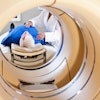Whole-breast radiotherapy may not be needed to treat early breast cancer, according to data presented at the European Breast Cancer Conference (EBBC), underway in Amsterdam and sponsored by the European Cancer Organization (ECCO).
Full-dose radiotherapy is the standard treatment protocol after breast-conserving surgery, even for women at low risk for disease recurrence. But it can cause tender and firm areas on the breast, as well as change its appearance, U.K. researchers said.
Dr. Charlotte Coles of Cambridge University Hospitals NHS Trust in Cambridge and colleagues investigated whether full-dose radiotherapy is needed in women with low-risk, early breast cancer. The group recruited 2,018 patients older than 50 years of age who had undergone breast conservation surgery for invasive early breast cancer tumors measuring smaller than 3 cm.
The women were randomized into three groups: 675 had whole-breast radiotherapy at the standard dose of 40 Gy to the whole breast; 674 had a dose of 40 Gy to the tumor bed and 36 Gy to the rest of the breast; and 669 had a dose of 40 Gy to the tumor bed only.
Coles' team found that, five years after treatment, all three groups had low rates of local recurrence and minimal side effects from the therapy. Patients in the second and third groups who received minimal or no radiotherapy outside the tumor bed were most satisfied by the treatment outcome.
The researchers intend to continue to follow up the trial patients for at least 10 years and further investigate patient-reported outcome measures, Coles said.



















